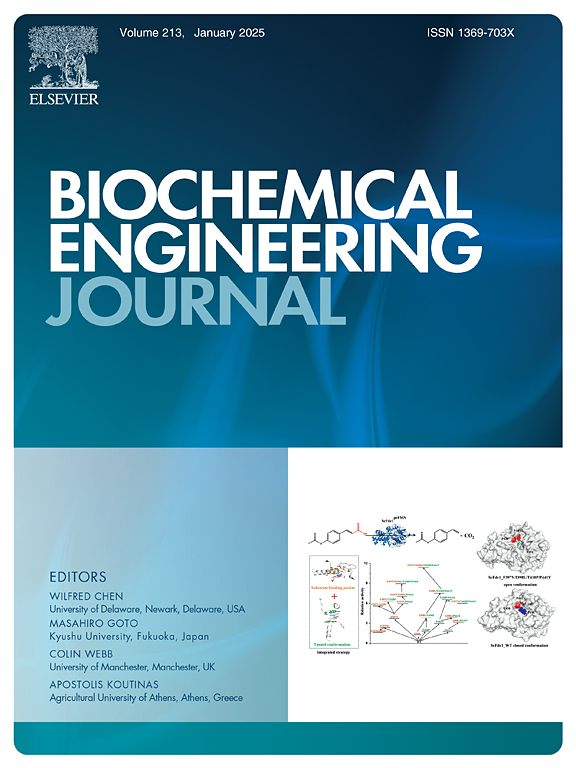Fe3O4@biochar对不同氨氮水平下产甲烷过程的影响
IF 3.7
3区 生物学
Q2 BIOTECHNOLOGY & APPLIED MICROBIOLOGY
引用次数: 0
摘要
氨抑制对厌氧消化具有毒性作用,不利于厌氧消化的顺利运行。为了提高氨抑制条件下AD产甲烷的能力,本研究考察了不同氨氮水平下添加Fe3O4@biochar对AD产甲烷过程的影响。当NH4+ -N浓度为1200 ~ 6000 mg/L时,Fe3O4@biochar显著提高了甲烷产量11.3 ~ 183.6 %。微生物群落分析表明,Fe3O4@biochar通过促进与电子转移相关的耐氨菌群的富集和上调相关基因的表达来缓解这种抑制。富集的未分类梭菌可降解乙酸,并与甲烷菌作为潜在的电子转移伙伴参与电子转移。同时,Wood-Ljungdahl途径中亚甲基四氢叶酸环氢化酶和亚甲基四氢叶酸脱氢酶的高表达进一步表明,氨抑制下甲烷产量的增加与SAO-HM途径的增强有关。本研究为不同氨抑制浓度对AD的调控提供了理论指导。本文章由计算机程序翻译,如有差异,请以英文原文为准。
Effect of Fe3O4@biochar on the methanogenesis process under different ammonia nitrogen level
Ammonia inhibition can have toxic effects on anaerobic digestion (AD) and is detrimental to smooth operation of AD. To enhance methane production of the AD under ammonia inhibition, this study investigated the effect of addition of Fe3O4@biochar on the methanogenesis process of AD at different ammonia nitrogen (AN) level. Fe3O4@biochar significantly enhanced methane production by 11.3–183.6 % at NH4+ -N concentrations from 1200 to 6000 mg/L. Microbial community analysis revealed that Fe3O4@biochar alleviated the inhibition via promoting the enrichment of ammonia-tolerant flora associated with electron transfer and upregulating the expression of related genes. The enriched unclassified Clostridiales degrade acetic acid and could be involved in electron transfer with Methanosarcina as potential electron transfer partner. Meanwhile, the high expression of methylenetetrahydrofolate cyclohydrogenase and methylenetetrahydrofolate dehydrogenase in the Wood-Ljungdahl pathway further demonstrated that the increase of methane yield under ammonia inhibition was associated with the enhancement of the SAO-HM pathway. This study provided theoretical guidance for the regulation of AD under different concentrations of ammonia inhibition.
求助全文
通过发布文献求助,成功后即可免费获取论文全文。
去求助
来源期刊

Biochemical Engineering Journal
工程技术-工程:化工
CiteScore
7.10
自引率
5.10%
发文量
380
审稿时长
34 days
期刊介绍:
The Biochemical Engineering Journal aims to promote progress in the crucial chemical engineering aspects of the development of biological processes associated with everything from raw materials preparation to product recovery relevant to industries as diverse as medical/healthcare, industrial biotechnology, and environmental biotechnology.
The Journal welcomes full length original research papers, short communications, and review papers* in the following research fields:
Biocatalysis (enzyme or microbial) and biotransformations, including immobilized biocatalyst preparation and kinetics
Biosensors and Biodevices including biofabrication and novel fuel cell development
Bioseparations including scale-up and protein refolding/renaturation
Environmental Bioengineering including bioconversion, bioremediation, and microbial fuel cells
Bioreactor Systems including characterization, optimization and scale-up
Bioresources and Biorefinery Engineering including biomass conversion, biofuels, bioenergy, and optimization
Industrial Biotechnology including specialty chemicals, platform chemicals and neutraceuticals
Biomaterials and Tissue Engineering including bioartificial organs, cell encapsulation, and controlled release
Cell Culture Engineering (plant, animal or insect cells) including viral vectors, monoclonal antibodies, recombinant proteins, vaccines, and secondary metabolites
Cell Therapies and Stem Cells including pluripotent, mesenchymal and hematopoietic stem cells; immunotherapies; tissue-specific differentiation; and cryopreservation
Metabolic Engineering, Systems and Synthetic Biology including OMICS, bioinformatics, in silico biology, and metabolic flux analysis
Protein Engineering including enzyme engineering and directed evolution.
 求助内容:
求助内容: 应助结果提醒方式:
应助结果提醒方式:


